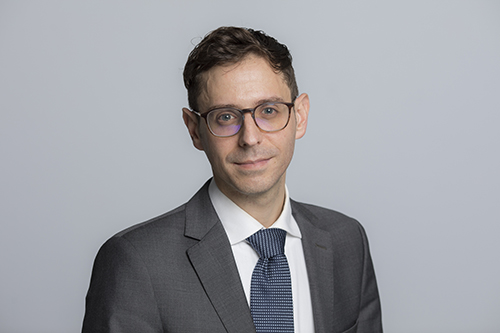Rafael Silvestre
The MBA showed me the power of networking and it also gave me invaluable lessons about building a CV to maximise effectiveness of applications and vital frameworks to prepare for interviews – not to mention the coaching preparation for such interviews. All these lessons I will take with me long after the end of the MBA.
Programme: Full-time MBA, 2021
Pre-MBA: Project Manager, Empresa de Pesquisa Energética, Rio de Janeiro, Brazil
Post-MBA: Senior Consultant, Deloitte, London, UK
Nationality: Brazil/Italy
Current industry: Consulting
Transitions made: Function, Industry, Location
Why did you choose the Full-time MBA at Bayes Business School?
I was a full-time employee for the Brazilian Government at the Energy Research Office which is a governmental body responsible for studies and planning in the energy sector including oil and gas, biofuels, and electric energy. A lot of the work I did was around renewable energy planning and research, improving access to electricity and mitigating environmental impacts of infrastructure and diversifying and greening the national energy matrix.
I chose Bayes Business School because of its location in the heart of the City of London and the highly regarded professors such as Scott Moeller whose connections to industry leaders was an important aspect. I also wanted a one-year MBA that had a good balance of academic learning and industry application, which I had with the Consulting Week and Strategy Project. I also felt like during the entire process, from before I started my application that I was never treated like a random number or applicant and that made me feel more comfortable to choose the school.
How has the Full-time MBA impacted your career?
The MBA at Bayes had a meaningful and noticeable impact in a number of areas. It expanded important soft skills such as leadership, communication and especially team work. It also exposed me to a diverse range of cultures and backgrounds (like I had never experienced before). Projects such as Integration Week, the Strategy Project and the Consultancy Week, in which we had to learn to compromise and work with colleagues in an intense and very short period, better prepared me for roles that required resilience, collaboration and the ability to influence.
The MBA showed me the power of networking and it also gave me invaluable lessons about building a CV to maximise effectiveness of applications and vital frameworks to prepare for interviews – not to mention the coaching preparation for such interviews. All these lessons I will take with me long after the end of the MBA.
As for my current role, I work with Climate Change and Sustainability and my activities can range from assessing companies’ Green House Gas (GHG) emissions and then creating a strategy and roadmap to help them achieve their net zero ambitions to quantitative scenario analysis in which I help clients understand how climate change is already disrupting their businesses and what role it will play in the future – from both a risk and opportunity standpoint.
What part did the Careers and Professional Development team play in your Bayes (formerly Cass) experience?
Personally, I think the part that the Careers and Professional Development team played was the most important aspect of the MBA. They gave me invaluable lessons on CV development, self-assessments such as StrengthScope, so I was clear on my strengths and how to promote them and coaching preparation for interviews and assessment. Furthermore, the constant help I got from my career’s advisors either through formal or informal conversations was invaluable, not only to prepare for interviews and “get into” the mind of interviewers and what they are looking for in candidates, but also to feel more confident about myself and maximise my chances of landing the roles I wanted.
There were also many useful workshops, but I think the one on presentation skills was probably the most relevant. My background is very academic, and I worked mostly on written reports to governmental officials, with some eventual PowerPoint presentations. So, having that workshop on how to better structure presentations was one that proved very useful, especially for consulting jobs.
Can you tell us a bit about your Business Mastery Project (BMP), which you undertook at Swoop?
I went through a formal process, in which I had to write a cover letter and subsequently interview with the person responsible for the project itself. For this specific project, I was not the only one to apply, in fact quite a few people from the cohort applied too, but fortunately I ended up being chosen at the end.
The scope of the project was to provide a ESG tracking for SME’s, the idea was that if investors had more information on how SMEs are addressing environmental (i.e. climate) risks and opportunities, that would allow SME’s to be more resilient for potential climate risks, and thus provide investors with more confidence to invest in them. Additionally, some funds also have negative and sometimes positive ESG-portfolio screening which would preclude them from investing in companies not aligned with their funds. Furthermore, for SMEs, it had the potential to drive down their cost of capital. To put it In a nutshell, it was all about reducing information asymmetry on ESG disclosures and how it could benefit both SMEs and investors.
What were your highlights from studying at Bayes Business School?
Hands down, the people. The cohort was so culturally diverse with such different professional experiences that it created this melting pot of learning and sharing professional and life experiences. The pairing of the groups in which people with different skills would comprise the different groups helped the process immensely. The connections we made during the MBA, especially during such difficult times, will probably last a lifetime.
